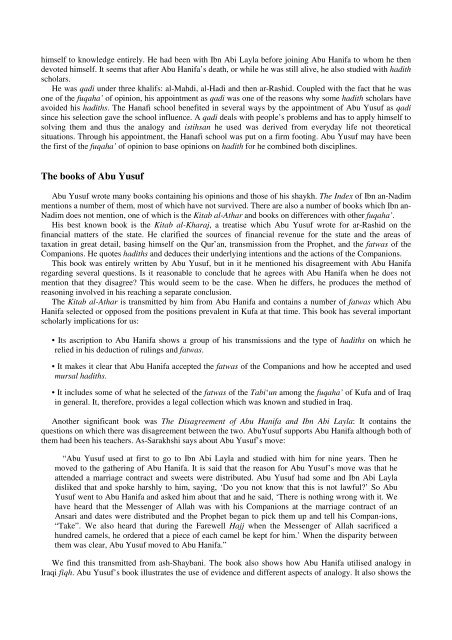Create successful ePaper yourself
Turn your PDF publications into a flip-book with our unique Google optimized e-Paper software.
himself to knowledge entirely. He had been with Ibn Abi Layla before joining <strong>Abu</strong> <strong>Hanifa</strong> to whom he then<br />
devoted himself. It seems that after <strong>Abu</strong> <strong>Hanifa</strong>’s death, or while he was still alive, he also studied with hadith<br />
scholars.<br />
He was qadi under three khalifs: al-Mahdi, al-Hadi <strong>and</strong> then ar-Rashid. Coupled with the fact that he was<br />
one of the fuqaha’ of opinion, his appointment as qadi was one of the reasons why some hadith scholars have<br />
avoided his hadiths. The Hanafi school benefited in several ways by the appointment of <strong>Abu</strong> Yusuf as qadi<br />
since his selection gave the school influence. A qadi deals with people’s problems <strong>and</strong> has to apply himself to<br />
solving them <strong>and</strong> thus the analogy <strong>and</strong> istihsan he used was derived from everyday life not theoretical<br />
situations. Through his appointment, the Hanafi school was put on a firm footing. <strong>Abu</strong> Yusuf may have been<br />
the first of the fuqaha’ of opinion to base opinions on hadith for he combined both disciplines.<br />
The books of <strong>Abu</strong> Yusuf<br />
<strong>Abu</strong> Yusuf wrote many books containing his opinions <strong>and</strong> those of his shaykh. The Index of Ibn an-Nadim<br />
mentions a number of them, most of which have not survived. There are also a number of books which Ibn an-<br />
Nadim does not mention, one of which is the Kitab al-Athar <strong>and</strong> books on differences with other fuqaha’.<br />
<strong>His</strong> best known book is the Kitab al-Kharaj, a treatise which <strong>Abu</strong> Yusuf wrote for ar-Rashid on the<br />
financial matters of the state. He clarified the sources of financial revenue for the state <strong>and</strong> the areas of<br />
taxation in great detail, basing himself on the Qur’an, transmission from the Prophet, <strong>and</strong> the fatwas of the<br />
Companions. He quotes hadiths <strong>and</strong> deduces their underlying intentions <strong>and</strong> the actions of the Companions.<br />
This book was entirely written by <strong>Abu</strong> Yusuf, but in it he mentioned his disagreement with <strong>Abu</strong> <strong>Hanifa</strong><br />
regarding several questions. Is it reasonable to conclude that he agrees with <strong>Abu</strong> <strong>Hanifa</strong> when he does not<br />
mention that they disagree? This would seem to be the case. When he differs, he produces the method of<br />
reasoning involved in his reaching a separate conclusion.<br />
The Kitab al-Athar is transmitted by him from <strong>Abu</strong> <strong>Hanifa</strong> <strong>and</strong> contains a number of fatwas which <strong>Abu</strong><br />
<strong>Hanifa</strong> selected or opposed from the positions prevalent in Kufa at that time. This book has several important<br />
scholarly implications for us:<br />
• Its ascription to <strong>Abu</strong> <strong>Hanifa</strong> shows a group of his transmissions <strong>and</strong> the type of hadiths on which he<br />
relied in his deduction of rulings <strong>and</strong> fatwas.<br />
• It makes it clear that <strong>Abu</strong> <strong>Hanifa</strong> accepted the fatwas of the Companions <strong>and</strong> how he accepted <strong>and</strong> used<br />
mursal hadiths.<br />
• It includes some of what he selected of the fatwas of the Tabi‘un among the fuqaha’ of Kufa <strong>and</strong> of Iraq<br />
in general. It, therefore, provides a legal collection which was known <strong>and</strong> studied in Iraq.<br />
Another significant book was The Disagreement of <strong>Abu</strong> <strong>Hanifa</strong> <strong>and</strong> Ibn Abi Layla: It contains the<br />
questions on which there was disagreement between the two. <strong>Abu</strong>Yusuf supports <strong>Abu</strong> <strong>Hanifa</strong> although both of<br />
them had been his teachers. As-Sarakhshi says about <strong>Abu</strong> Yusuf’s move:<br />
“<strong>Abu</strong> Yusuf used at first to go to Ibn Abi Layla <strong>and</strong> studied with him for nine years. Then he<br />
moved to the gathering of <strong>Abu</strong> <strong>Hanifa</strong>. It is said that the reason for <strong>Abu</strong> Yusuf’s move was that he<br />
attended a marriage contract <strong>and</strong> sweets were distributed. <strong>Abu</strong> Yusuf had some <strong>and</strong> Ibn Abi Layla<br />
disliked that <strong>and</strong> spoke harshly to him, saying, ‘Do you not know that this is not lawful?’ So <strong>Abu</strong><br />
Yusuf went to <strong>Abu</strong> <strong>Hanifa</strong> <strong>and</strong> asked him about that <strong>and</strong> he said, ‘There is nothing wrong with it. We<br />
have heard that the Messenger of Allah was with his Companions at the marriage contract of an<br />
Ansari <strong>and</strong> dates were distributed <strong>and</strong> the Prophet began to pick them up <strong>and</strong> tell his Compan-ions,<br />
“Take”. We also heard that during the Farewell Hajj when the Messenger of Allah sacrificed a<br />
hundred camels, he ordered that a piece of each camel be kept for him.’ When the disparity between<br />
them was clear, <strong>Abu</strong> Yusuf moved to <strong>Abu</strong> <strong>Hanifa</strong>.”<br />
We find this transmitted from ash-Shaybani. The book also shows how <strong>Abu</strong> <strong>Hanifa</strong> utilised analogy in<br />
Iraqi fiqh. <strong>Abu</strong> Yusuf’s book illustrates the use of evidence <strong>and</strong> different aspects of analogy. It also shows the














